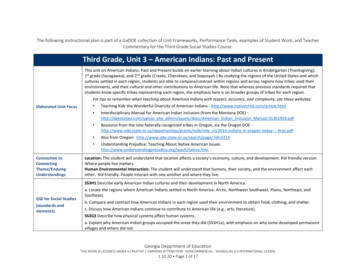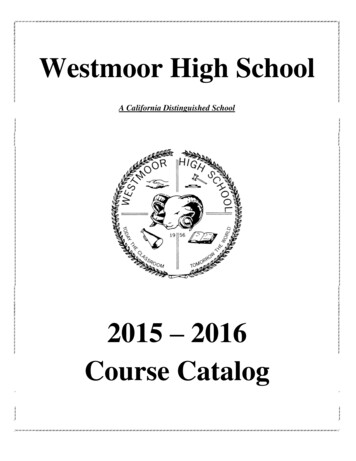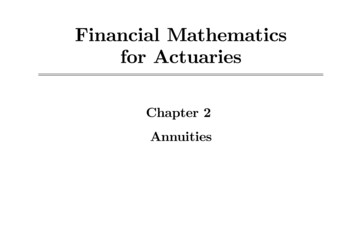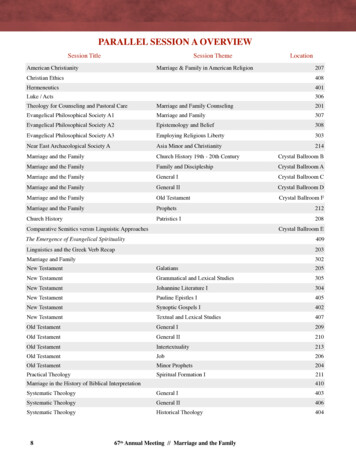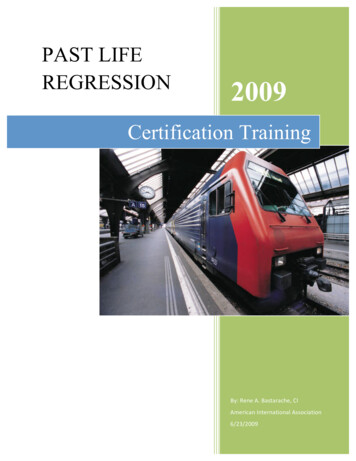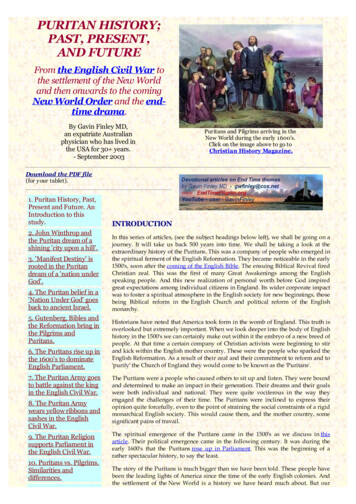
Transcription
PURITAN HISTORY;PAST, PRESENT,AND FUTUREFrom the English Civil War tothe settlement of the New Worldand then onwards to the comingNew World Order and the endtime drama.By Gavin Finley MD,an expatriate Australianphysician who has lived inthe USA for 30 years.- September 2003Puritans and Pilgrims arriving in theNew World during the early 1600's.Click on the image above to go toChristian History Magazine.Download the PDF file(for your tablet).1. Puritan History, Past,Present and Future. AnIntroduction to thisstudy.2. John Winthrop andthe Puritan dream of ashining 'city upon a hill'.3. 'Manifest Destiny' isrooted in the Puritandream of a 'nation underGod'.4. The Puritan belief in a'Nation Under God' goesback to ancient Israel.5. Gutenberg, Bibles andthe Reformation bring inthe Pilgrims andPuritans.6. The Puritans rise up inthe 1600's to dominateEnglish Parliament.7. The Puritan Army goesto battle against the kingin the English Civil War.8. The Puritan Armywears yellow ribbons andsashes in the EnglishCivil War.9. The Puritan Religionsupports Parliament inthe English Civil War.10. Puritans vs. Pilgrims.Similarities anddifferences.INTRODUCTIONIn this series of articles, (see the subject headings below left), we shall be going on ajourney. It will take us back 500 years into time. We shall be taking a look at theextraordinary history of the Puritans. This was a company of people who emerged inthe spiritual ferment of the English Reformation. They became noticeable in the early1500's, soon after the coming of the English Bible. The ensuing Biblical Revival firedChristian zeal. This was the first of many Great Awakenings among the Englishspeaking people. And this new realization of personal worth before God inspiredgreat expectations among individual citizens in England. Its wider corporate impactwas to foster a spiritual atmosphere in the English society for new beginnings, thosebeing Biblical reform in the English Church and political reform of the Englishmonarchy.Historians have noted that America took form in the womb of England. This truth isoverlooked but extremely important. When we look deeper into the body of Englishhistory in the 1500's we can certainly make out within it the embryo of a new breed ofpeople. At that time a certain company of Christian activists were beginning to stirand kick within the English mother country. These were the people who sparked theEnglish Reformation. As a result of their zeal and their commitment to reform and to'purify' the Church of England they would come to be known as the 'Puritans'.The Puritans were a people who caused others to sit up and listen. They were boundand determined to make an impact in their generation. Their dreams and their goalswere both individual and national. They were quite vociferous in the way theyengaged the challenges of their time. The Puritans were inclined to express theiropinion quite forcefully, even to the point of straining the social constraints of a rigidmonarchical English society. This would cause them, and the mother country, somesignificant pains of travail.The spiritual emergence of the Puritans came in the 1500's as we discuss in thisarticle. Their political emergence came in the following century. It was during theearly 1600's that the Puritans rose up in Parliament. This was the beginning of arather spectacular history, to say the least.The story of the Puritans is much bigger than we have been told. These people havebeen the leading lights of America since the time of the early English colonies. Andthe settlement of the New World is a history we have heard much about. But our
11. The Puritans in theNew World and thesigning of the MayflowerCompact.12. Puritan belief and theAmerican Revolution vs.the French Revolution.13. America's Puritanstoday and the 'ReligiousRight'.14. The abortion issueand America's Puritanstoday15. Today's Puritans andthe expansion ofAmerica's globalpeacemaking role.16. Today's AmericanPuritans and the rise ofDominion Theology17. Puritan belief and thefuture history ofAmerica.journey of discovery must trace the roots of the Puritans back into English history aswell. This is where we shall make some rather startling discoveries. Then our tripwill take another interesting turn. It will lead us "back to the future".PURITAN HISTORY: THE SPIRITUAL DIMENSIONTO THE STORY. AND AN APPRECIATION OF WHATTHE PURITANS DID IN ENGLAND IN THE 1600's.It is important to consider the spiritual elements that are at work in peoples, landmasses, and nations. This is essential in any study of history and for geography aswell. It is especially true as we study Puritan history. Because in the 1500's and early1600’s a group of politically active English Biblical Christians were on the rise. Andin the English Civil War that ensued they would change England forever. During theferment of those epic times the Puritans were also setting forth on a great migrationacross the Atlantic Ocean. There in the new World they would set the standards fornot only English colonial history but the subsequent 1776 birth of the Americannation. They would continue to have an impact on America in the centuries thatfollowed. And the latter half of the 20th Century would see them emerge as thegreatest superpower Western Christendom has ever seen.The Puritan impact on world history has been profound so far.Future Puritan history will be even more spectacular.Indeed it will be more awesome than words can describe.The English Puritans made their political emergence in the 1600's. This was duringthe very same time period in which they began to embark upon their epic migrationsto the New World. Here were a vibrant, spiritually energized, and hopeful companyof people. Their new status as free men walking personally and as a nation underGod blessed the nation greatly. In spite of their shortcomings this faith fed theirpersonal and national dreams and visions for a bright future. In England they hadbeen bound and determined to set a new agenda for their English Church. Their heart's desire was to see their belovedEnglish kingdom move forward into the Biblically enlightened flows of the Reformation that were then sweepingwestern Christendom. These were the true movers and shakers of their time but their emergence did not come merelybecause of political aspirations. There was a deeper reason why the Puritan movement erupted into history during the1500's. That reason, as we shall discuss, involved some very telling spiritual factors, not least of them being the comingof the English Bible to the common man.The Puritans burst onto the political stage of English history in the 1620's to 1650's. This same time period saw verylarge migrations of Puritans to America. But the English part of Puritan history is not often appreciated in America.This is in part due to the way that this history is taught. As Westerners we are inclined to lapse back into theHellenistic Greco-Roman mindset we learned in our former passage through the Greek culture. We think in boxes. Oureducational systems compartmentalize history. It chops up the sweep of history and boxes it up into separate subjectsaccording to nation or a certain century. So the story of the Puritans is in two boxes, those being "American History"and "English History". So students do not get a full bird's eye overview of Puritan history as it arose in England,crossed the Atlantic to the New World and flowed on through the centuries.This is most unfortunate. American students know their American history and the role the Puritans played in the earlysettlement of the New World. But few are given much of an opportunity to learn Puritan history as it arose in Englandearlier in the 1500's and 1600's. So they are not getting the complete picture. Students are not being told the "rest of thestory". A nd in the rush to do well and please the teacher or professor few are inclined to think "outside the box".There are other reasons Puritan history has been neglected. It is no secret that the academic elites at the top of theteaching hierarchies espouse a secular humanist view of this world and its histories. When we look at the slanted waythey characterize the Puritans in the syllabuses their disdain for them becomes very obvious. We also see that Puritanhistory is minimized and the impact and scope of the Puritan contribution to American history is cloaked.Why is this so? From the late 1800's onwards and especially with the coming of centralized public schools theeducational elites have championed the so-called Enlightenment which began in earnest in the 1700's. TheEnlightenment embraced the humanistic rationalism of men like Voltaire, Thomas Paine, and John Locke. Secularhumanism was and remains today part of an Illuminist agenda to rid the West of the Judeo-Christian faith. TheEnlightenment was rising up during the 1700's. This was at the same time that the Great Awakenings were fosteringBiblical Christianity in England and America.Quite clearly there has been and continues to be a spiritual war, an ideological war, and an information war going on
here in America. So it should come as no surprise that American educators at the top of the pyramid do not like thePuritans. Quite clearly from the textbooks we see that they very definitely champion the Enlightenment, all this inspite of its dismal failure when it was let loose and crashed in flames amidst the bloodshed of the Reign of Terror inthe French Revolution.The matter of academic freedom and control over the content of textbooks is troubling. School teachers and collegeprofessors are no longer given the teaching liberty they once had. Local schools are not permitted to decide whichtextbooks they will teach from. Under the educational elites the writers of textbooks quickly learn what elements ofhistory to emphasize or de-emphasize to land these massive contracts. Then too, teachers unions such as the powerfulNEA and the AFT are in the picture. At the top teacher's unions are well known to espouse a left wing secularhumanist mindset. The elites currently bearing rule over public education would particularly like to delete from therecord any positive contribution Biblical Christian faith has brought to America. So it is not surprising that they usetheir academic power over the curriculum to present the Biblical Christianity in a bad light. That is why they haveconsigned the Puritans to the dustbin of history.Why is this happening? It seems that nestled in the public trust we have some decidedly godless hardliners. They aredriven by their dark angels to not only set a certain social agenda but also indoctrinate students into their ownsecularist and humanist mindset. Most of all, they, or the angels that deceive them, intimidate them, and pull theirstrings, do not want to see American students continue in or develop a Biblical world view.The matter of "separation of church and state" is a case in point. The original intent of the Founding Fathers was the"non-establishment of any Church Institution by the state". But the people behind the curtain have re-engineered andtwisted this doctrine. They now proffer it to Americans as "the rigid exclusion of Christian faith from the state and frompublic places".The impact of this on the schoolroom, as is now well known has been devastating. The serious decline in academicscores, the bullying which is tolerated, the jungle classrooms, and the school shootings all attest to the moralbankruptcy of public education. And yet elitists setting the agenda for the teaching of American history continue to behard-liners. They still seek to undermine the very Christian faith that made the nation rise to greatness.The broad trans-Atlantic scope of what is really an Anglo-American Puritan History is just not appreciated in Americatoday. It is difficult for history students to connect the dots. And the full sweeping saga of the Puritans is a story yetuntold. So in order to see what the Puritans did in England and in America we must seek out earlier more reliablesources and do our own homework.This is most unfortunate. What we are seeing here is in fact a form of academic censorship. Because when the facts ofhistory happen to be of a spiritual nature we discover that they have been studiously ignored. They have been left outof the story. Some very important historical details and themes are missing from the textbooks. So we are left with afalse and decidedly negative view of the Puritans, and a boring one at that.This academic tyranny over the facts is not just true of history and the liberal arts. Over in the higher halls of scienceanother academic war on truth is being waged right now. (See the video 'Expelled' by Ben Stein.) Or do a YouTubesearch for "Expelled, Ben Stein".Liberal educators are in the driver's seat in America today. In place of the truth they are very keen to advance a numberof their favorite myths about the Puritans. They seem to want their students to denigrate them as a people. Then theywant students to file Puritan history away in the dustbin of history and forget it. They want to characterize the Puritansas a group of Christian zealots who rose up briefly in the 1600's. They say that the Puritans came to America, spreaddisease, trampled an idyllic and perfect native Indian society, and then died out when "the Enlightenment" came andmercifully liberated the West from its chains and the religious superstition of the medieval era.The Enlightenment was, (and remains today), a belief system set forth by mortal men. The new "faith" of theEnlightenment was in human reason or rationalism. It was humanistic or man-centered. It was naturalistic lifting upNature with a capital N. And it was secular, that is it was worldly, completely discounting the revealed truths of HolyScripture. This secular humanism was the "faith" championed by the French Revolution. (And we know whathappened there.) To see a comparison the French Revolution to the American Revolution from a Biblical world viewclick hereThe Puritans have been much maligned. Many seem to want to rewrite the history books to render the story of thePuritans to just a fading footnote to an old archaic history, one that is no longer relevant in the Enlightened andprogressive Post-Christian era in which we now live. This is the same fable fostered by National Geographic magazine,the History Channel, and Hollywood. It is the celestial humanistic socialism of the new Star Trek and Babylon 5. It isthe social engineering our children are subjected to in public schools. Younger children are caused to see the Puritansas little more than the comic characters from a bygone era. They are represented as quaint people dressed in black withthe funny hats and shoes with buckles. These iconic images of the Puritans, inaccurate as they may be, are neverthelesstrundled out every fall during the time of Thanksgiving.
Another perennial myth is that the Puritans were legalistic mean spirited religious killjoys. The truth is something elseentirely. The Puritans were not the drab prune faced company as portrayed by popular mythology. Nor were they thecold hearted legalistic hacks portrayed by Hollywood. As a matter of fact they did not even dress in black. ThePuritans were Englishmen emerging from the Elizabethan era. They wore bright clothing in the manner of their time.They were a hopeful cheerful company of people. They drank ale in the moderation of which they were renowned.Puritans generally exhibited a "can do" attitude and exhibited a gracious and positive disposition to the challenges oflife. Whenever they encountered problems with people or with the political powers they showed a willingness to sitdown and talk things through. They were negotiators and would make every effort to sort things out in the spirit of theChristian graces.For the Puritans everything in their lives was a matter for prayer. This was how they got things done. Their faith wasnot just a Sunday thing. It was part of who they were. Their relationship with God was the wellspring of their life. ThePuritans were people who walked through life with God by their side. With the coming of the 1611 King James Bibleand the Geneva Bible they were now able to learn about their God and how He handled things because they couldread their own personal copy of the Bible.Theirs was more than a faith in a religion or faith in a national Church. It was a very personal faith, And so learning forthemselves and teaching their children was a very serious matter to them. In the witness to their faith and for the causeof Biblical Christianity the Puritans had suffered greatly. Along with their Pilgrim friends they had been grievouslytreated by the established Church of England and the English Crown. But in spite of the trials they had been greatlyblessed. For them their journey was also a romance, a pilgrimage, and an adventure. They were now privileged toknow the fundamentals of the faith, to respond to God's call to salvation, and to walk personally with Him. They alsoknew that come what may, He would take them on to better things.This Biblical world view was, and remains today, the main spiritual wellspring for good in this world. More thananything else personal Christian faith was the key to the success of the English speaking people in the New World.Puritans and Pilgrims were freed to think and act as a witness and an agent before God and man. And under God theywere now able to set a course towards their destiny in a howling wilderness that called for rugged individualism. TheEuropeans back in the Old World were beholden to the protection of landlords, ecclesiastical dignitaries, andepiscopal overseers. But the wilderness places of the New World called for a spirited, hopeful, and rugged companyof people of faith and dreams who were no longer dependent on these hierarchies.Puritans were individuals who were appreciative but no longer subject to man-made religious institutions. Theyenjoyed this religious freedom because they could walk in it. They were subject to God, knew Him, and walked withHim personally. Matters of conscience were very important to them. Nevertheless the Puritans, for the most part, werea bright and cheerful company. They were a people who enjoyed life and took on its challenges with gusto. To thePuritans life was a grand adventure. The lives of their families and their surrounding community was now in theirhands. They knew the Biblical principles. They knew that a man reaps what he sows. If they were not diligent beforeGod and before their fellow man then there would be dire consequences. It could be a case of "Paradise Lost". Theyknew this and they walked accordingly.The Puritan Milton was active in the English Civil War. Indeed "Paradise Lost" was the title of Milton's epic poem.Another soldier in the Army of Parliament under Oliver Cromwell was John Bunyan. He found salvation and personalfaith in God whilst serving in the Puritan Army. After the war Bunyan began to preach in the open air, only to bearrested and imprisoned. While in prison he proceeded to write the classic Biblical Christian allegory, "Pilgrim'sProgress".So if we really want to see the history of the Puritans we need to face up to all the facts here. The dry facts of economicsand a political assessment of the flashpoints of history are important to be sure. And matters of geography andnational resources do form the basis for a lot of the human story, this is true. But economics with the ebb and flow ofcapital and labor is not the main engine of history. Nor are the exploits of men on battlefields the ultimate decidingfactor. These material and earthy details will never be enough to round out a full and meaningful history of any nationor any people. Nor will it explain the remarkable energies of certain men and nations and why they were victorious intheir histories. So to view and appreciate a fuller more accurate history we must widen our radar screens. We must beprepared to take in the spiritual dimension to the story.The spirit of a man or a nation is the all important element. That spirit, whether it be good, bad, or ugly, is what makesthem tick. It is the spirit that determines the character of the men, the women, the individual citizens at the heart of thenation. And so if we are going to talk about "human resources" we must go deeper than mere psychology or anassessment of some generic set of "values". We must get a handle on the spiritual resources inside the hearts of theindividual building blocks of the nation. We must come to know the people that make up the body politic we happento be studying. To understand the Puritans we must get a clear picture of their spirit and their character and get anaccurate record of just how they impacted the people, the nation, and the world around them. This is absolutelyessential if we are going to truly understand the history of the Puritans or the history of any group of people for thatmatter.
The spiritual dimension to American history is unappreciated and hidden away. But the truth remains. And thelessons God showcases for us in the chronicles of the nations are His-story. And so we can be sure that the full storywill eventually come out. Because the vital spiritual elements wrapped up in the history of the Puritans are there forus to see, if we have eyes to see. If Puritan history must be rewritten true to the facts then let it be done. Let us praythat an accurate account of this inspiring history will at last be told.And why is all this so important? The answer is quite simple. The history of the Puritans has not ended. Puritanhistory is, in fact, an ongoing saga. Puritan history may come to a grand climax during the coming years. Should thisturn out to be the case, then the time has come. As English speaking people we need to do our homework. It is time forus to sit down and do more than just talk turkey. Now is the time for us all to hear "the rest of the story".IS PURITAN HISTORY A THING OF THE PAST?PERHAPS NOT.No study of the Puritans is complete without being prepared to take a close look at the Puritan heart. This is veryimportant. Because here we see the fountainhead of the Puritan energy to see things change. As Biblical Christians thePuritans were decidedly in the minority. And yet these were the people who turned England upside down in the early17th Century.The player below contains a short 5 minute video for broadband users.It shows the opening scenes to the movie "Cromwell" .This excellent film is available at Vision Video.If you need to Download Quicktime click HERE.Left-click to launch in external player.All Americans should know this earlier history of the Puritans in England. And why? Because the English Civil Warshowcases the potent politico-religious elements that still drives much of our present American history. The story ofthe Puritans coming to power back in England goes beyond the regicide of Charles I. It did not all center on one manOliver Cromwell and his role as Lord Protector during England's Puritan military dictatorship. This was the EnglishReformation. At its heart it was a religious movement. And it brought with it a groundswell of new thought, newdreams, and great expectations. This was the potent ferment that emerged from the Biblical Revival of the 1500's.The Puritan Army itself was heavily involved in this religious revival. Against the backdrop of a compromised andmoribund Church of England the Army was the main engine of Puritan reform in England. John Bunyan, who wrotePilgrim's Progress, served in the Puritan Army. The Army, under the command of Oliver Cromwell, utilized a very
sophisticated well organized "homeland security" style of central intelligence agency. This is showcased in the famous19th Century painting below. If you look carefully at this painting you will notice something else which helps usappreciate Anglo-American part of the jigsaw puzzle. The Puritan official, the sergeant, and the Calvalry officer are allwearing yellow ribbons.Does the heraldry of the yellow ribbons go back to the Puritans in England? Apparently so. The yellow ribbons wereworn on the battlefield by soldiers of the Puritan Army, the Army of Parliament. They were in a military conflict withKing Charles I and the royalists during the English Civil War. You may click on the image to go to a website thatexplains the details of this remarkable painting."When Did You Last See Your Father?"by W.F. Yeames (1835-1918).Click on the image for an explanation of details in the painting.Oliver Cromwell as Lord Protector set forth major generals throughout Great Britain. And the Puritan Armyadministered a benign form of martial law concentrating on cultural and moral reform. The Puritans had a profoundimpact on the English speaking people on both sides of the Atlantic. What they did to create the solid citizenry thatmade Great Britain and America great is simply not appreciated. But a comparison of the American and FrenchRevolutions is very instructive in this regard.Puritan encampments were not just military gatherings. The Army of Parliament was right in the thick of England'sBiblical revival. Soldiers joined together around their campfires. They talked about military and spiritual matters ofblood covenant, as men at the cutting edge of history always do.One of those Puritan soldiers was John Bunyan. He had fought at the Battle of Naseby. The war and the Word of GodBunyan was exposed to in the Army gave rise to some deep soul searching. Post traumatic stress finally gave way to atotal commitment to Jesus Christ. This personal experience in God was a watershed in Bunyan's life. His awful burdenof sin was released. Bunyan's life was changed forever. Thwarted by the powers from preaching openly he later spentmany years imprisoned at Bedford Gaol. There he faced the powers of darkness with something more powerful thanthe sword. He brought the Word of God to the English speaking people in a literary work that has been a greatblessing to many people all around the world for over 350 years. He wrote 'Pilgrim's Progress'. Next to the Bible thisclassic work has been the most influential book in all of western literature.One important element of Pilgrim's Progress has not been appreciated.This is the story of a Puritan who makes a transition to become a Pilgrim.This will happen again, and on an epic scale.Not just in a man, but in a nation.The Puritans, (then as now), were men and women out on a mission. They were the sort of people who got thingsdone. During the time of the English Civil War England, Scotland, and Northern Ireland were all forged into oneUnited Kingdom. Great Britain would go on to become the foremost maritime nation. They took over from the Dutchand defeated the French at Waterloo and Trafalgar to become the new maritime superpower. Great Britain would latergo on to colonize one quarter of the world and become the British Empire. People from geographic locations allaround the would become part of the British Commonwealth.So what can we learn about the Puritans here? These Anglo-American dreamers were politically engaged. They werenot just religious mystics or passive pietists. They were nation builders. These people of the Book went right into thehalls of government. Then, as now, they were intent on setting things right. Biblical Christians have a Gospel mandate
which takes them across oceans and draws them into a global destiny. For the Puritans this took on a decidedlypolitical character and one of dominionism.As we saw with Oliver Cromwell the Puritans were prepared to forge treaties with people beyond their own nationalborders. At a deep spiritual level their drive was fashioned after the Great Commission. But their own personalenergies, ambitions, and charisma added to this. Their internationalism was not based upon military conquest as wesaw when France became the superpower under Napoleon or when Germany attempted to become the superpowerunder Adolf Hitler. But like the Dutch the English speaking powers sought to advance peaceful trade. As an islandnation the survival of Great Britain depended upon taking dominion of the sea lanes and the exercise of sea power.Like the British superpower of the 19th century, the current American superpower has also pursued a policy of'possessing the gates of their enemies'. See this video. The Puritan ethic and its energy would later infuse VictorianEngland and give rise to the British Empire. The same Purital zeal crossed the Atlantic to express itself in the AmericanRevolution preserving it from the empty spiritually bankrupt humanistic illuminist rhetoric and the godless bloodymayhem known as the Reign of Terror that would doom the French Revolution a few short years later. The 19thCentury would see an expansive globalist American foreign policy set forth as the principle of 'manifest destiny'. Afterthe dropping of two atom bombs ended World War 2 and the Bretton Woods Agreement the U.S. has assumedleadership in world trade and in international affairs. The present American dominion in multinational business, theU.N. and the WTO is something we might call the Pax Americana. American world dominion, like that seen in theBritish Empire, was based upon peaceful trade and a global policing oversight. The British had achieved this with seapower. The Americans have done it with air power and an arsenal of nuclear submarine based ICBM's. This is thedominion and the global reach of the American eagle.So the dreams of the Puritans have been unprecedented and historic. An early example of this world vision was theremarkable trans Atlantic actions of the U.S. Navy and Marines against the Islamic Barbary Pirates in theMediterranean. This took place during the early 19th Century off the North African coast of Tripoli. The Puritan visionwent far beyond tradition and race and took them beyond the 'dreams of their fathers'. England under Oliver Cromwellenter
crossed the Atlantic to the New World and flowed on through the centuries. This is most unfortunate. American students know their American history and the role the Puritans played in the early settlement of the New World. But few are given much of an opportunity to learn Puritan history

